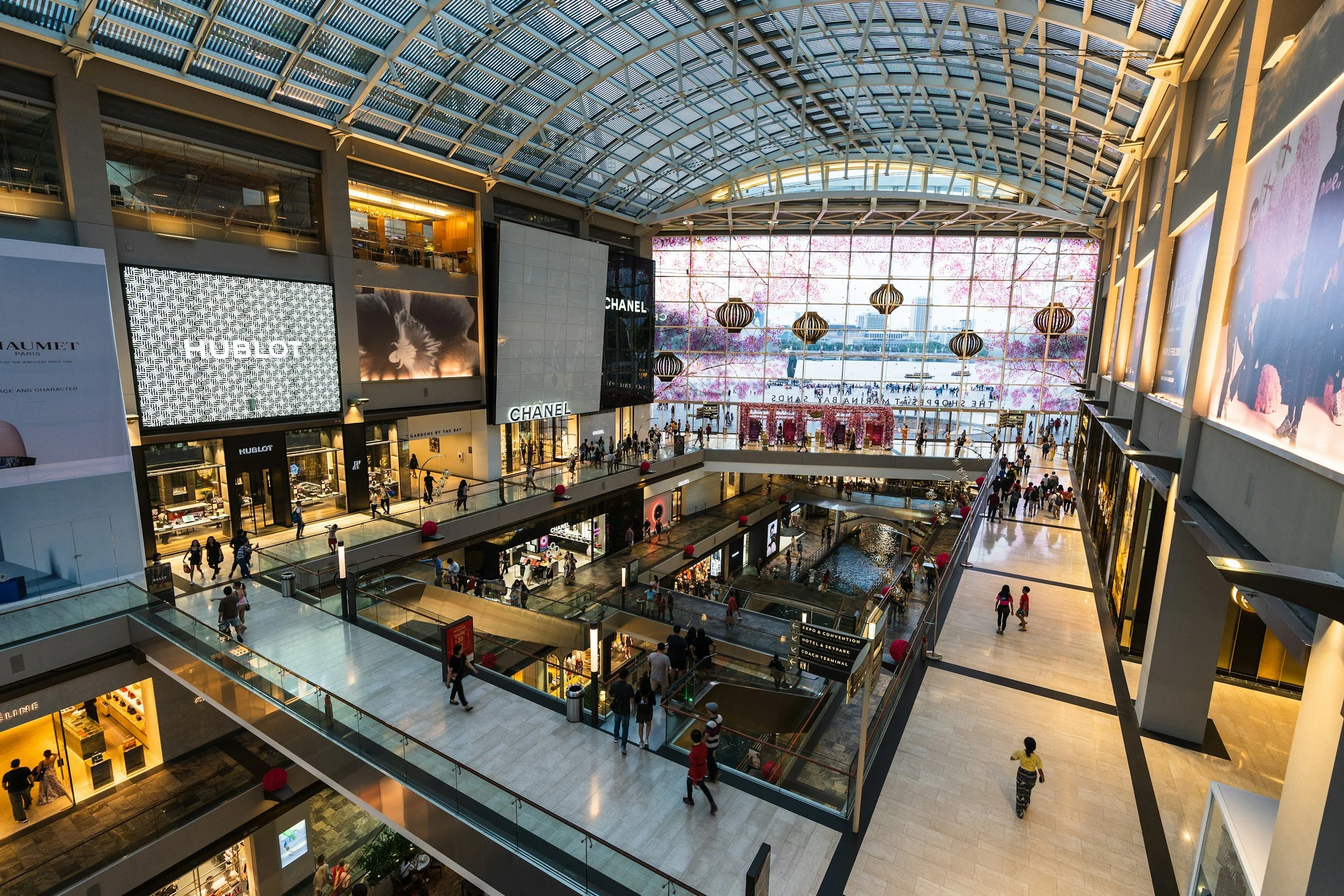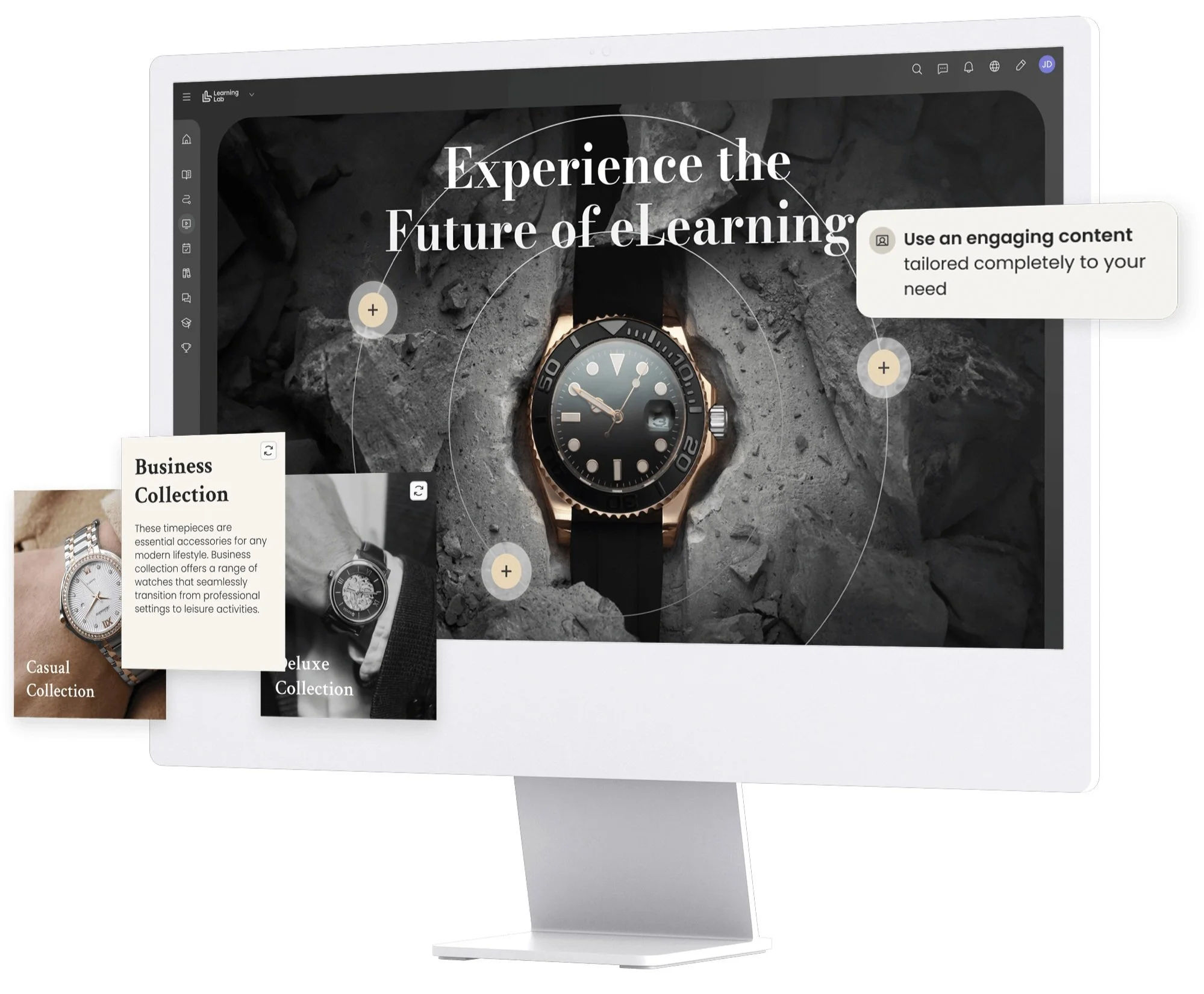Why Retail Training Needs a Different LMS
Transforming Retail Training: Why a Retail-First LMS Is Essential for Brand Consistency and Sales Success
In retail, training is more than just skill-building — it’s an extension of the brand itself.
Generic LMS platforms often fall short because they can’t deliver the immersive, branded experiences that retail staff need to truly embody a company’s identity.
A Retail-First LMS solves this gap by offering no-code customization, mobile-first access, and design tools that mirror the brand’s DNA across every training touchpoint. This ensures that sales teams around the world learn in a consistent, engaging, and visually aligned environment.
The result is not only stronger brand consistency but also more motivated employees who translate their knowledge into confident client interactions and measurable sales growth.
The Unique Nature of Retail Training
Retail is unlike any other sector: it is fast-paced, customer-facing, and deeply brand-driven.
Sales associates work in environments where product knowledge, client interaction, and brand storytelling converge in real time on the shop floor.
Added to this are the realities of the industry: short attention spans and limited time on the sales floor, high turnover requiring fast onboarding, seasonal product launches with frequent updates, and global networks with multilingual, multicultural needs.
Traditional LMS platforms, built primarily for corporate training, lack the agility, design, and brand immersion to meet these challenges. To truly support frontline teams and ensure consistent client experiences worldwide, retail training needs a dedicated LMS solution — one tailored to the unique demands of the industry.
Resume
Retail is fast-paced: frequent product launches and seasonal collections require constant updates
Retail is customer-facing: training directly impacts sales performance and client satisfaction
Retail is brand-driven: learning must embody the DNA and storytelling of the brand
Short attention spans and limited time on the sales floor
High turnover and the need for fast onboarding
Seasonal product launches and frequent updates
Global networks with multilingual, multicultural requirements
Traditional LMS platforms → built for corporate, not retail
Retail requires a tailored LMS → agile, branded, and built for the shop floor
Why Traditional LMS Platforms Fall Short?
Traditional LMS platforms are often designed with a 360° “all-in-one” mindset, trying to serve every industry but excelling at none.
For retail, this approach quickly shows its limits. Big players offer rigid solutions with little dialogue, leaving brands with tools that cannot adapt to the fast pace of product launches, seasonal campaigns, and the unique DNA of luxury or lifestyle houses.
What retail needs instead is a Retail-First roadmap: a partner-driven LMS, open to synergies and feedback, designed for the realities of frontline teams.
From mobile-first access and shop locators, to branded landing pages, multimedia product knowledge, community management, multilingual content, and retail-specific onboarding, a Retail-First LMS ensures every learning experience is consistent with the brand while directly supporting sales performance and customer experience.
Resume
360° vs Retail-First → Generic “all-in-one” features vs a tailored roadmap for retail
Big players, little dialogue → Vendors rarely adapt vs a partner co-building with brands
Brand experience focus → Fully branded training environments aligned with brand DNA
Retail-specific onboarding → Simple admin tools and quick learner onboarding designed for store teams
Community management → Spaces for peer-to-peer sharing, tips, and collaboration
Mobile-first & shop locator → Training accessible anytime, anywhere, with store-specific context
Multimedia product knowledge → Video, audio, interactive modules to master collections
Multilingual capability → Seamless training across global networks
Dedicated landing pages & dashboards → Clear, localized, and brand-aligned access for learners and managers
Behind the LMS: Building a Retail Partnership for Innovation and Growth
An LMS is not just a platform; behind it stands a dedicated team ready to co-create the journey with retail brands.
Success in retail training requires more than technology — it demands a long-term, dynamic, and creative roadmap developed in partnership.
This means organising regular workshops, maintaining an open dialogue, and ensuring direct access to managers and technical experts who can provide quick, effective support.
By fostering collaboration and innovation, the LMS partner becomes more than a vendor: they become a true extension of the brand, offering tailored solutions and new features that address daily retail challenges.
Resume
An LMS needs a team behind it, not just technology
Retail requires a long-term partnership built on trust and creativity
Importance of workshops to co-design roadmaps and new features
Dynamic dialogue between brand and partner to stay agile
Easy access to managers and technical experts for fast support
Open channels for regular conversation and idea-sharing
From vendor to strategic partner, helping retail brands face daily challenges
Community Management in Retail Training: Specific Needs
In retail, training is not just about delivering knowledge — it’s about creating a living community of learners who share, connect, and grow together.
To achieve this, a Retail-First LMS must include community management features that foster collaboration, motivation, and engagement across global teams.
Audio & Video Chat → enable real-time conversations between associates, managers, and trainers.
Online Discussions → forums and threads where employees can share best practices, client stories, or product tips.
Blended Learning → tools to organize onsite workshops alongside digital modules, ensuring theory meets practice.
Social & Peer-to-Peer Learning → staff can exchange experiences, tips, and solutions, building knowledge from the field.
Creative Formats like “InstaLearning” → short, social-media-style training capsules for quick product or brand updates.
Messages & Notifications → ensure every learner stays connected to campaigns, launches, and training milestones.
Events & Agenda Management → easy scheduling of webinars, workshops, or seasonal brand events.
Virtual Classrooms → one-to-one or group formats to simulate boutique training and live coaching.
Gamification Elements → award prizes, badges, and certifications to recognize progress and motivate teams.
Leaderboards → spark healthy competition across boutiques or regions, boosting engagement and performance.
Challenges → Competing Against Larger Groups
By combining these features, community management transforms retail training into a social, engaging, and brand-immersive ecosystem. It keeps employees motivated, creates a sense of belonging, and ensures that every associate — whether in Paris, Milan, or Tokyo — feels part of the same story and culture.
Innovative Creative Formats: Next-Level Engagement for Retail Training
In the dynamic world of retail, training demands more than static slides—it requires formats that are interactive, memorable, and aligned with how modern teams learn.
A retail-first LMS must deliver creative learning experiences that resonate with frontline staff and reinforce brand identity.
Features like video quizzes, branching scenarios, and interactive video assessments transform passive content into hands-on, experiential training. Social-inspired formats such as InstaLearn—short, swipeable learning cards—keep knowledge fresh and intuitively accessible.
A robust branded design gallery ensures visual consistency. Meanwhile, AI support personalises content with auto-translation, smart suggestions, and automated media generation.
Learners stay engaged through diversified formats like multimedia storytelling, scenario branching, and interactive content—all designed to boost retention, reinforce brand DNA, and drive real-world performance.
Key Features for Creative Retail Training Formats
Video Quizzes: Engage learners visually; test product knowledge in a playful, memorable way .
Interactive Video Assessments: Enable online product presentations or customer management scenarios through click-through evaluations.
Scenario Branching: Deliver “choose your own adventure” paths in videos or slide modules to mirror real-life sales situations .
InstaLearn: A mobile-first, social-style format delivering daily updates, flash refreshers, and brand storytelling in swipeable cards .
Branded Design Gallery: Instantly generate visually consistent, on-brand templates and interactive assets.
AI Support: Automate content creation—text, imagery, translation, and suggestions—streamlining updates with creative control .
Interactive Content Library: Include video tutorials, simulations, animations, and drag-and-drop modules for robust learner engagement .
Multimedia-First Experience: Blend audio, video, animations, and interactive media into a richly immersive learning environment .
The Specific Needs for a Strong Branded Learning Experience in Retail Training
In retail, training is not just about transferring knowledge — it is about immersing teams in the brand universe.
Every learning touchpoint must echo the same care, creativity, and consistency found in the brand’s boutiques, campaigns, and product experiences.
To achieve this, a powerful and creative Authoring Tool is essential. Retail brands need an online, intuitive tool that allows them to design stunning, animated, and fully branded courses with ease. This means complete control over fonts, layouts, backgrounds, images, videos, animations, and interactive features, ensuring every element reflects the brand’s identity.
Today, a learning platform is no longer a generic back office system; it must function like a website, where stakeholders can fully customize the environment and maintain total ownership of the experience. From branded dashboards to personalized learner journeys, every detail should reinforce the brand’s DNA.
A Retail-First LMS makes this possible by offering creative flexibility, design freedom, and the ability to craft learning experiences that feel as unique and polished as a flagship store or a global campaign.
Key Needs for Branded Retail Learning
Creative Authoring Tool → design stunning, interactive, and animated courses directly online.
Full Branding Control → customize fonts, layouts, colors, and media to reflect brand DNA.
Immersive Design Options → use images, videos, animations, and interactive elements as course backgrounds.
Website-Like Experience → LMS that feels like a brand’s digital flagship, not a corporate tool.
Custom Dashboards & Landing Pages → personalized spaces aligned with the visual identity.
Total Ownership → empower stakeholders to edit, adapt, and evolve content without technical barriers.
Consistent Brand Storytelling → ensure every training touchpoint delivers the same quality and emotion as client-facing experiences.
The Impact: From Training to Sales Performance
When retail training is designed with a Retail-First LMS, the benefits go far beyond knowledge transfer.
It creates a direct impact on brand consistency, employee performance, and customer experience across the entire retail network.
By providing a branded, mobile-first, and engaging learning environment, brands can ensure that store teams not only absorb information faster but also translate it into better service, higher sales, and stronger loyalty.
Training becomes a strategic driver — turning associates into confident brand ambassadors who embody the brand’s DNA and deliver it consistently to clients worldwide.
Key Impacts
Stronger brand consistency across global teams
Faster onboarding and upskilling → reduced turnover
Improved customer interactions → higher sales and satisfaction
Enhanced employee engagement and loyalty
Conclusion: Why Retail Training Needs a Different LMS
Generic LMS platforms cannot meet the unique demands of retail — they lack the agility, branding flexibility, and frontline focus needed to support fast-paced, customer-facing environments.
Retail training requires a dedicated Retail-First LMS: one that delivers brand consistency across global teams, empowers employees with engaging, mobile-first learning, and directly drives sales performance.
The Learning Lab is the Retail-First LMS
This is exactly why The Learning Lab LMS stands out as the perfect Retail-First LMS.
Built with and for the retail industry, it combines a no-code, fully customizable platform with a creative authoring tool, allowing brands to design stunning, branded, and interactive courses in-house. From InstaLearning formats inspired by social media to AI-powered support, multilingual capability, shop-locator integrations, gamification, and community management tools, The Learning Lab is crafted to meet every specific need of fashion, luxury, beauty, and lifestyle brands.
To truly transform training into a competitive advantage, brands must invest in solutions built for their world. The Learning Lab is more than a platform — it is a partner, providing both the technology and creative expertise to help your teams learn faster, perform better, and deliver the brand experience your clients expect.




